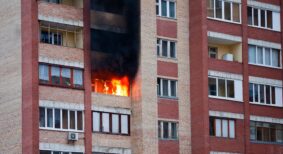A majority of Ontario landlords opted to e-file applications to the Landlord and Tenant Board (LTB) Tribunal in the first year it was possible to do so, but a sizable minority relinquished the potential $15 discount and submitted traditional paper documents. An even smaller proportion of tenants took advantage of the online portal, as 59 per cent spent the extra $5 dollars it costs them to apply through paper-based channels.
The Financial Accountability Office (FAO) of Ontario’s recently released tally of approximately 1,100 provincial service fees reveals that landlords paid more than $12.5 million toward the administrative costs of the 100,706 applications they filed with the Tribunal between April 2017 and March 2018. Tenants chipped in another $377,000 for 7,723 submissions.
“E-filing began in earnest in the spring of 2017, but, in a lot of scenarios, it’s more of a convenience for the Board than applicants,” observes Joe Hoffer, a partner with Cohen Highley LLP, whose work regularly takes him to one of the LTB offices. “We are at the Board almost every day picking up Notices of hearing and it is more convenient for us, administratively, if we just drop off our applications at the same time.”
Including $95,200 associated with 4,688 applications from the co-op housing sector and $175,000 from all parties’ requests to review an order, the LTB accounts for just 0.45 per cent of $2.9 billion in Ontario fee revenue collected during the period the FAO scrutinized. Nevertheless, the volume and sum of Tribunal admin charges exceed most other tolls tied to commercial real estate and/or professional and skilled personnel who work in the industry.
Flow-through costs to real estate
In comparison, the Assessment Review Board garnered about $320,000 from 1,760 non-residential appellants challenging the value assigned to their properties, while the Local Planning Appeal Tribunal collected about $629,000 from 2,099 appellants disputing planning decisions. The Building Materials Evaluation Commission exacts the highest single fee developers/building owners are likely to encounter — $11,000 to seek permission for innovative construction materials, systems or designs not explicitly authorized by the Building Code — but it was levied just six times during the year.
Building service providers’ registration and license fees account for another modest fraction of provincial fee revenue. The Ministry of Municipal Affairs and Housing took in about $1.3 million in various examination and licensing fees for building officials, designers and design firms, and sewage system installers. That includes nearly 3,350 practitioners who each paid $150 to take an exam required to prove their qualifications to apply the Building Code. If demand remains relatively stable, the Ministry’s fee revenue should increase in 2018-19 and again in 2019-20 since 23 of its administration charges rose by 2 to 2.8 per cent at the beginning of this year.
Together, security guards, private investigators and their employers submitted about $3.4 million in license fees to the Ministry of Community, Safety and Corrections with the bulk of that in $80 outlays from nearly 39,600 individual guards and investigators. Meanwhile, landscapers, grounds-keeping and pest control contractors and building owners/managers with in-house grounds-keeping services were among the 5,500 proponents who paid $90 to $200 for pesticide licenses, collectively rendering $701,000 to the Ministry of the Environment.
Discount sways more landlords than tenants
The Landlord and Tenant Board Tribunal accepts online applications for four categories of appeal, aligned with the two most common appeals that landlords and tenants make. In 2017-18, landlords paid more than $10.7 million to submit: 47,578 applications to evict a tenant for non-payment of rent and collect rent owed; and 11,397 applications to terminate a tenancy and evict the tenant. Tenants paid nearly $223,000 to submit 2,829 applications related to subjugation of their rights and 1,814 addressing neglect of maintenance.
Landlords’ fees in both cases were $175 for online applications — an option that 52 per cent of appellants chose — or $190 for paper-based submissions. Tenants were charged $45 for online applications or $50 for paper-based applications, with just 41 per cent opting to e-file.
Hoffer speculates owners/managers with larger and more regionally dispersed portfolios may be the most enthusiastic e-filers since staff in a central location can coordinate the process and submit required forms to any of the eight LTB offices province-wide. “Then they’d have to have their staff in the different regions pick up the Notices of hearing at whichever LTB office was involved,” he adds.
Tenants may be less aware of the e-filing option or lack online access and/or the credit or debit card required to facilitate the process. Alternatively, they can submit paper applications at an LTB office, at a larger number of designated ServiceOntario centres or by mail.
“Many times tenants file in response to a landlord’s application and they may get the idea to file when they go to the Board office and ask counter staff for help,” Hoffer advises. “As time goes on and the level of tenant awareness goes up, maybe we will see an uptick in tenants e-filing.”
Landlords also submitted more than 41,000 applications in 2017-18 related to; above-guideline rent increases; sublets; ending a tenancy with the tenant’s agreement; varying rent reductions; collecting owed rent; and determining whether the Residential Tenancies Act applied to units in question. Rarer matters included: 29 applications related to tenants changing the locks; five requests to review a work order arising from provincial maintenance standards; and one request to transfer a tenant from a care home.
Limited scope for sub-metering appeals
Just six tenants paid the $50 fee to apply for a rent rebate or other reparations related to unit sub-metering for electricity consumption. However, the avenues for appeal through the LTB are limited and tied to landlords’ conduct rather than that of unit sub-metering providers.
Tenants can argue that landlords did not properly inform them of expected electricity costs, failed to provide an appropriately energy-efficient refrigerator or to disconnect sub-meters from electric heat sources, but there is no opportunity to contest unit sub-metering providers’ pass-through administrative charges at the Tribunal. Meanwhile, the Ontario government’s newly adopted Restoring Ontario’s Competitiveness Act rescinds the Ontario Energy’s Board authority to regulate those charges.
Sub-metering companies are also among the building service providers who pay provincial fees as a cost of business. That includes an annual $800 registration fee for each license they hold, and a $1,000 fee for every application filed with the Ontario Energy Board.
Barbara Carss is editor-in-chief of Canadian Property Management.





